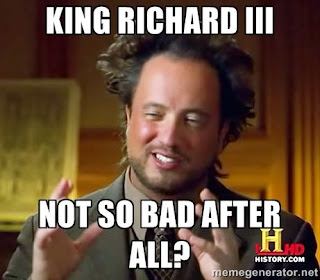It caught me off guard that this book was more than a novel about a guy stuck under unfavorable conditions trying to solve a whodunit. It turned out to be so much more. It almost in a way is a revolution changing all of time. Who would have imagined?! It gets one questioning everything they know about the past! I've never been one to delve into the many and sometimes monotonous layers of history, but this book got me quickly thinking significantly more dynamic about historical events and how their stories come about.
This novel seems to define "history" as events that have happened in the past and are recorded in textbooks and history books alike. "Tonypandy" is the word the characters seem to exclaim whenever one of these events of the past that is a fixed part of "history" is proven to be fictional or made-up somewhere down the line.
If one actually thinks about it for a bit, it is actually very easy for the facts of events that happened so long ago to become misconstrued and contorted especially considering who is recording them to begin with. People in social scenes today can't even get the facts of events that happened yesterday straightened out which is how rumors spread about. "Tonypandy" is most likely first established when someone who is biased to one side of the story tells the story through their eyes or in a censored way as to put themselves into a better light. The book mentions how in hindsight the lies were obvious to pick out because Henry VII was so mysterious about his actions as opposed to Richard III who had nothing to hide. "Tonypandy" then after that will start to evolve into a more rounded "story" rather than narratives of real life just by human nature alone, and these sometimes ridiculous fairy tale-like tales continue to get passed down from there just by tradition.
I got the notion especially towards the end that the book's stance on history is that one must question everything and not be quick to believe anything you hear about in history. It's something that has always been in the back of the mind especially whenever I consider the classic story of Thanksgiving. This novel, however, has brought it to the very front of my mind, and now that I consider it, I think there are a lot of facts maybe that are left out in history, and therefore, manipulating how one thinks of events in history. However, it is extreme to think that all events are fabrications of the mind and didn't actually happen. This novel does have an extraordinary point, and it's stance is definitely probably true some of the time.












